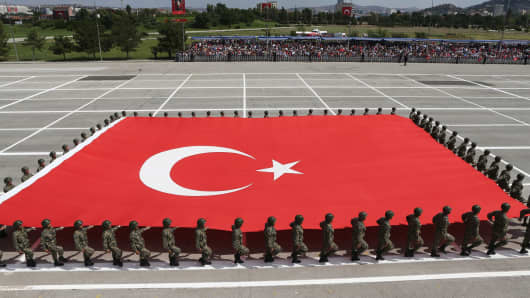President Obama is pursuing a multilateral response to threats posed by the Islamic State in Iraq and Syria (ISIS). Turkey is indispensable to Obama's "coalition of the willing" but the Islamic State is a conundrum for Turkey.
Joining the battle could put Turkish hostages at risk or spark terrorist attacks inside Turkey. At the same time, Turkey ignores the Islamic State at its peril. The Islamic State exacerbates tensions on Turkey's borders and polarizes Turkish society.
Read MorePresident Obama: US will 'hunt down' ISIS 'wherever they are'
Multilateral measures to degrade and destroy the Islamic State would be much more effective with Turkey's participation. Turkey is a valued member of NATO. It also shares a border with both Syria and Iraq.
There are several ways that Turkey can contribute to Obama's coalition of the willing without directly engaging in combat operations. Incirlik Air Force Base in Southeast Turkey is minutes away from the front line. Incirlik is an ideal staging ground for reconnaissance drones, as well as refueling and resupply of U.S. and British warplanes.
Read MoreOp-ed: Anger is not a strategy
Incirlik can also serve as a hub for delivering humanitarian supplies to the Kurdistan Regional Government (KRG), which has opened its doors to nearly 1 million people displaced by the Islamic State. Kurds, Yazidis, Turkmen, Christians and Arabs have sought sanctuary in Iraqi Kurdistan.
Turkey can reduce the Islamic State's income by refusing to buy oil from its wells in Raqqa and Jazirah in Syria, and as wells in Iraqi Kurdistan.
Turkey must take additional steps to seal its border with Syria to prevent new fighters from entering the battlefield.
Read MoreWWII flashback: Is history repeating itself?
Obama plans to present his multilateral plan at the UN General Assembly later in September. Other states, especially in the Persian Gulf, will measure their commitment against Turkey's participation.
Turkey cannot sit on the sideline. It has a direct interest in the outcome of events in Syria and Iraq. Turkey can, however, mitigate negative repercussions by acting discreetly yet purposefully against the Islamic State.
Commentary by David L. Phillips, director of the Program on Peace-building and Human Rights at Columbia University's Institute for the Study of Human Rights. He is a former senior adviser and foreign affairs expert to the U.S. Department of State during the administrations of Presidents Clinton, Bush and Obama. He is also author of the forthcoming book, "The Kurdish Spring: A New Map for the Middle East" (Transaction Publishers).
Read MoreISIS displaying a deft command of varied media



